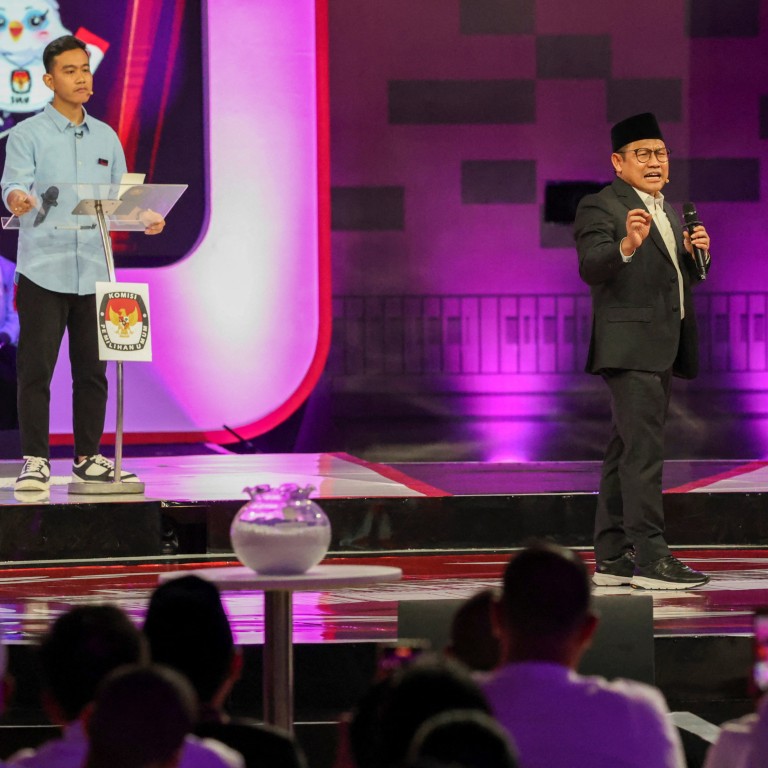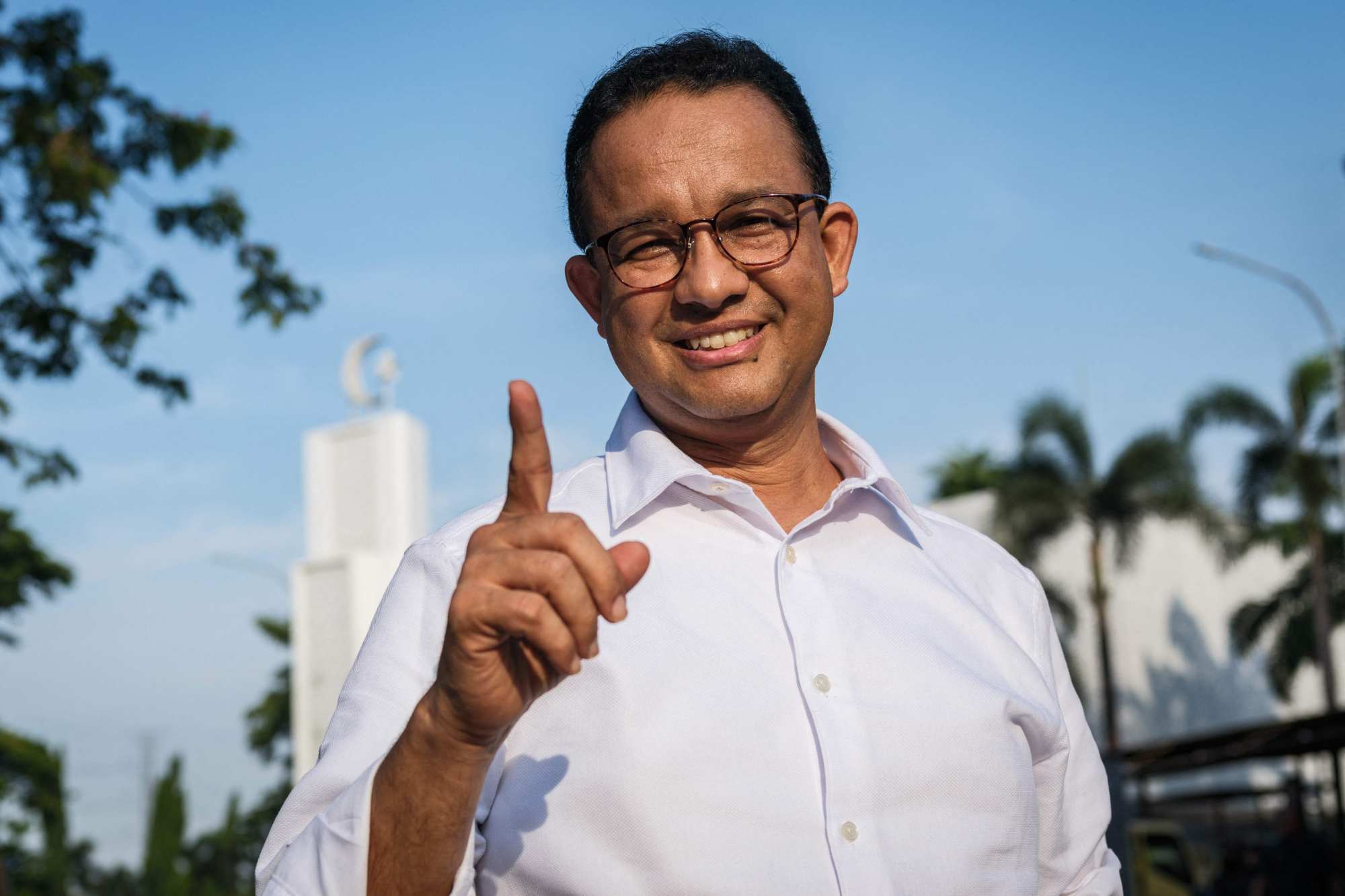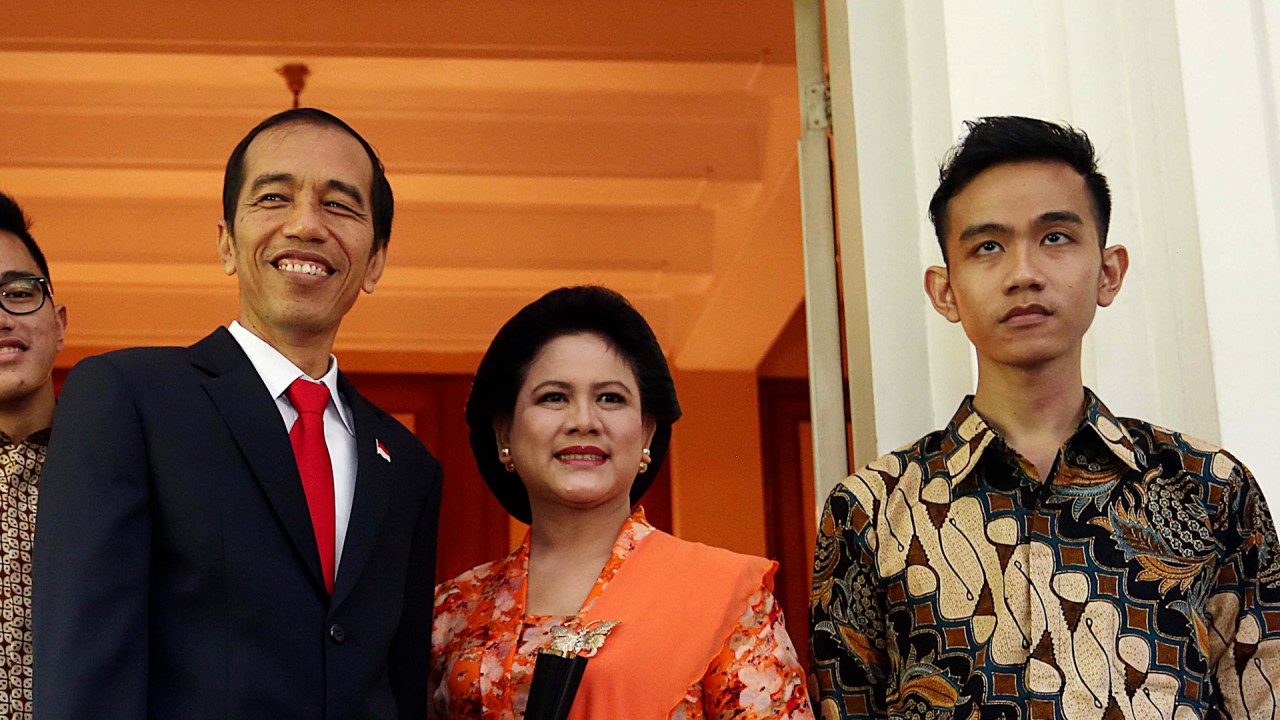
Indonesia election 2024: Gibran gets grilled by rivals on new capital, hits back with acronyms in debate
- Indonesia’s first vice-presidential debate got heated as Gibran Rakabuming and rivals clashed over economic and infrastructure issues
- Gibran faced tough questioning over his experience and Solo’s development while he defended his father’s new capital project
Gibran, the 36-year-old mayor of the city of Solo in Central Java, also launched onstage offensives by questioning his rivals – Mohammad Mahfud, the coordinating minister of politics, legal, and security affairs and running mate to former Central Java governor Ganjar Pranowo, and Muhaimin Iskandar, chairman of the National Awakening Party (PKB) and running mate of ex-Jakarta governor Anies Baswedan – on their climate and economic policies, using jargon and abbreviations that analysts said was designed to puzzle his much older competitors.
The debate quizzed Indonesia’s vice-presidential candidates on their knowledge of economic, finance, trade and infrastructure issues. Gibran kicked off the discussion by highlighting his and Defence Minister Prabowo’s economic policies, which include continuing Widodo’s ban on exports of raw critical minerals and expanding it to agricultural and fisheries products, as well as building a new capital city in Borneo.
What policies are Indonesia’s 3 presidential hopefuls pushing?
Mahfud, whose ticket represents the ruling Democratic Party of Struggle (PDIP), said they would make corruption eradication a priority while achieving an ambitious goal of seven per cent economic growth. Muhaimin said he and Anies would heavily tax Indonesia’s 100 richest people and dedicate 150 trillion rupiah (US$9.7 billion) to boost the skills of young Indonesians.
While the debate started tranquilly, candidates started to get snarky after Gibran was asked by panellists if his development priority would be infrastructure or the quality of Indonesian workers, should he and Prabowo be given the mandate to lead Southeast Asia’s largest economy.
“Both are important. We don’t really need the state budget to build [the infrastructure and the quality of our workers]. For example, our new capital city [in East Kalimantan]. Many people don’t understand that not 100 per cent of its development will come from the state budget, only twenty per cent of it will. The rest will be covered by private and foreign investments,” Gibran said of the US$30 billion project.
Mahfud responded: “I know that we must build the new capital as it’s Jokowi’s legacy, but as far as I have read, until now there has not been a single foreign investment coming in.”
Gibran then suggested that Mahfud, a constitutional law professor, “search on Google” about what he claimed was a litany of investments that had been made into the new capital.
“There has been a lot of investment coming in. There might be more, maybe after the presidential election. [The investors] will definitely wait and see, to see [the state of] political stability in Indonesia,” Gibran added.
Gibran also pointed out Muhaimin’s inconsistency, as he “used to support the new capital, but now you don’t support it since you joined Anies, who supports change [in the government].”
Ian Wilson, senior lecturer in politics at Australia’s Murdoch University, questioned why none of the candidates asked Gibran about how the new capital could equalise prosperity in Indonesia.
“The elephant in the room with arguments for the new capital is how building a massively expensive new capital city will contribute to reducing inequality between regions. There is no example of purpose-built capitals achieving this, most resulting in economic and political recentralisation,” he wrote on X, formerly known as Twitter.
‘Political misogyny’: why is Jokowi’s wife cast as villain over son’s VP run?
Jab fest
Gibran’s track record as mayor of Solo, his first political position which he has served in since early 2021, was also put under the spotlight, with Muhaimin asking him for “tips and tricks” for bagging Jakarta-funded infrastructure projects.
According to Muhaimin, the development in Solo over the past two years has been more rapid compared to its neighbours, thanks to at least 32 state-funded projects Gibran brought in as mayor. Widodo’s critics argue that these initiatives indicate nepotism and attempts to boost his son’s political success.
Gibran claimed that the government trusted Solo to host these projects because the city showed “a readiness” to meet investors’ demands, such as relocating residents to free up land for investors’ use.
Gibran was hardly on the defensive all night. He later asked Mahfud, 66, how he plans to regulate the carbon capture and storage market. Mahfud said that he would first read an academic manuscript on the subject before creating the regulation.
“My question has not been answered, what are your regulations for carbon capture storage? Please answer according to the question. No need to [be ambiguous],” Gibran told Mahfud.
Indonesia’s Anies Baswedan targets Jokowi’s Nusantara plan in election strategy
Gibran also succeeded in confusing PKB’s Muhaimin, an Islamic-leaning political party backed by many members of Indonesia’s biggest moderate Muslim group, Nahdlatul Ulama.
“Since you are the chairman of PKB, I’m sure you really understand this. What will you do to lift Indonesia’s rank in the SGIE?” Gibran said.
Muhaimin forfeited his two-minute response time by asking Gibran the meaning of SGIE, which stands for State of the Global Islamic Economy. Many viewers pointed out that Gibran mimicked Widodo’s tactic in the 2019 presidential election during which he used buzzwords such as “unicorn” to baffle Prabowo, who was the politician’s two-time election rival and top critic before turning into one of his loyalists.
“Frankly this is not a fair question since this is not a game of Jeopardy. But this is quite effective in puncturing Muhaimin’s image as a figure of the Islamic movement,” Yohanes Sulaiman, politics and security lecturer at the University of Ahmad Yani in West Java, wrote on X.
“Gibran is well-prepared and smart-alecky. Both Muhaimin and Mahfud, sadly, look unprepared in this debate, though Muhaimin performs way worse than Mahfud.”

Murdoch University’s Wilson said that Gibran deployed a “tedious gotcha attempt by using an obscure English-language acronym,” while another X user wrote that “Gibran mastered it, which is clear because of very complete preparation & practice.”
The latest polling shows Prabowo maintaining a strong lead over his rival presidential candidates, an edge that has grown since he tapped Gibran to be his running mate despite the controversy that decision generated among those who accused Widodo of abusing his power to ensure his son could run.
Indonesia’s presidential election takes places on February 14.


